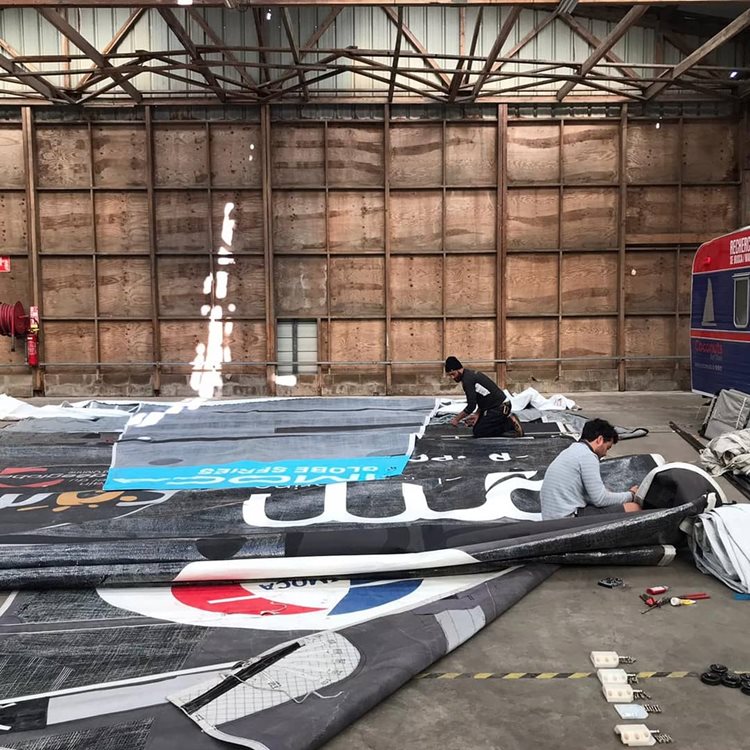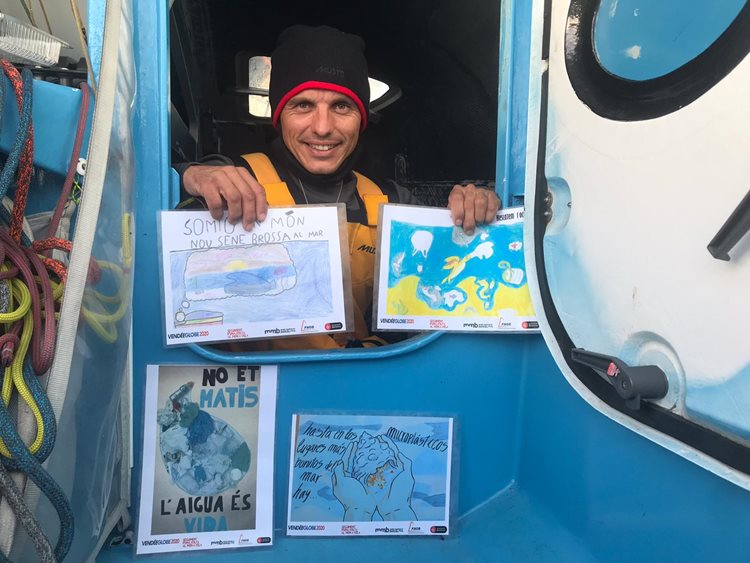Every sailor has imagined the thrill and challenge of racing in the sport’s most prestigious events such as the America’s Cup or the Vendée Globe. But at the end of the day, these events are a stage for the top professionals and household names, right? Not necessarily. Enter Catalonian firefighter and 2020 Vendée Globe sailor Didac Costa.
The sailor
To be clear, the Barcelona native is hardly a stranger to this level of competition, and his resume speaks for itself with achievements such as crossing the Atlantic solo for the Mini Transat and double-handing the Barcelona World Race, not to mention his noteworthy 2016 Vendée Globe campaign, which made him the second Spaniard to finish the Vendée Globe and the first in 25 years. (Noteworthy because he finished 14th despite lower funding levels and a lightning strike that damaged the boat’s electrical components.) He’s clearly a bad-ass sailor, but, like each of us, he had to start at the beginning, and, like each of us, he’s a regular, hard-working guy who spends his time and resources on what he loves most−being on the water.
The boat
Didac will again tackle the 2020 Vendée Globe aboard his IMOCA One Planet One Ocean. As one of the oldest boats in the race, it has stories to tell. The 60-foot-long boat was originally commissioned by Ellen MacArthur for her 2000-2001 Vendée Globe campaign, in which she took an impressive second place. Twenty years later, Didac is looking to add another chapter to the boat’s legacy. He and his crew have worked tirelessly over the past few years to update and modernize the boat. Responding to a question from the Vendée Globe committee about the hours he’s spent working on the boat, Didac answered laughing, “I don't know how to count them! It would be easier to tell you how many hours I have not been working on her. In reality, these days are the ones I was working in my day job as a firefighter plus maybe no more two or three afternoons in a year that I have taken off (laughs).”

“The truth is that I am happy to be in the race at all,” Didac says. “Yes, the boat is getting old; she is one of the oldest in the entire fleet now and you always want to be here with a better boat. The advantage with this boat now is that I have been able to make some modifications; in terms of equipment she is in a better shape than in the previous edition and I know this boat very well. I see it as a positive side of this, she is the boat I have and I am glad to be here with her.”
The boat is also equipped with a new suite of Quantum sails. Using Quantum’s iQ® Technology, Quantum’s Antoine Thuillier and top designers worked closely with Didac and his team to create a versatile, fast, reliable, and good-looking inventory for the One Ocean One Planet IMOCA.
Didac and his team are also passionate about the sport of sailing itself and introducing the next generation to the wonders of the sea, especially those from marginalized communities and with diverse abilities. When it’s not racing around the globe, the boat is serving as a tool for good. Didac teamed up with the Intergovernmental Oceanographic Commission of UNESCO (IOC-UNESCO). As the flagship of the IOC’s “One Planet, One Ocean” campaign, the boat is used for environmental research.
The challenge
If you’re not familiar with the Vendée Globe, it is the Mount Everest of sailing and arguably the most extreme race of any kind on the planet. For starters, it’s a long race. Competitors set sail from Les Sables d’Olonne on the west coast of France and then head south on the Atlantic, around the Cape of Good Hope, across the Southern Pacific, around Cape Horn, and back up the Atlantic to Le Sables d’Olonne. If sailors complete the course (only 89 of the 167 competitors in the eight editions have finished), they will have sailed on average 28,000 miles (about 52,000 km) in 70 to 100 days. It’s a long race. The cherry on the top? It’s a solo, unassisted, and non-stop event. As the official Vendée Globe website describes it: “…everyone has to rely on what they can do during the round the world voyage. Routing is strictly prohibited. The sailors have to find their own way around, carry out any repairs following on from damage, which is likely to happen… and they have to take care of themselves when injured or ill.” Click here to get the full scoop on the race.

And this is what Didac willingly signed up for. As sailors, we get it. The challenge of sailing is what connects us. Even if we’re not about to sign up for the 2024-2025 Vendée Globe, it gets in our blood and we just want more.
“You never stop thinking about this race,” Didac explains. Making such a project like this is very difficult and you really see the difficulties that lie along the way. But having the experience of the previous edition, I did know that fighting, making the maximum effort to take into account all the aspects that must be prepared in order to participate, we could be here. We have never lost hope, and thanks to a great determination here we are about to cross the start line; we are so very happy about this.”
Stay tuned to Quantum’s Instagram and Facebook (@quantumsails) pages and emails for updates and special joint content throughout the event, and be sure to follow Didac’s campaign on his Instagram and Facebook (@_didaccosta_) pages and subscribe to emails on his website (www.didaccosta.com).
Read the full Vendée Globe interview with Didac here.
______
Vendée Globe, Didac Costa “Didac Costa, 'Boat Work? I Have Had Only Two Or Three Afternoons Off In the Last Two or Three Years!', News, accessed 29 October 2020